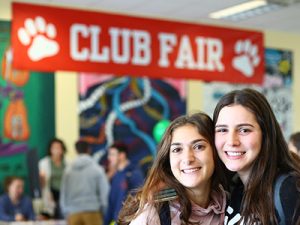The Other Good Book: An English Departmental Update
March 1, 2016
 At this point in the year, as we, behind the scenes, start planning summer reading, we are trying to mix things up for our students so that they don’t get too complacent. Mr. Dunton is working on the interplay between Lord of the Flies and communicating using propaganda with his freshmen, while his seniors are reading James Wright’s poetry and analyzing it.
At this point in the year, as we, behind the scenes, start planning summer reading, we are trying to mix things up for our students so that they don’t get too complacent. Mr. Dunton is working on the interplay between Lord of the Flies and communicating using propaganda with his freshmen, while his seniors are reading James Wright’s poetry and analyzing it.
Meanwhile, in Rabbi Rosen’s senior class, students have designed prisons, arguing about the primary responsibilities a society has to those it incarcerates. Coming on the heels of reading Kaffir Boy: The True Story of a Black Youth’s Coming of Age in Apartheid South Africa and a discussion of Apartheid and the changeable notions of criminality and justice, the students are gaining a hold on the controversial concepts behind a well-rounded judicial system.
The 10th grade has some students working on a charity project, identifying problems, vetting charities via rubrics and online resources which they research, while others are discussing the position of God and destiny in the world, as prompted by Thorton Wilder’s The Bridge of San Luis Rey.
Mr. Gotlieb is working with his 12AP class to compare presentations of speeches in Hamlet, watching famous versions and arguing the merits of each as they direct their own versions in their minds. Mrs. Wang-Birnbaum’s AP group is keeping up their work on their independent LEADS paper while completing Hamlet and applying Freudian and feminist lenses to the text.
In Mrs. Wang-Birnbaum’s junior classes, students are exploring Civil Disobedience through the works of Thoreau and MLK, creating bridges and looking for rhetorical strategies in their presentations of their thoughts to the public.
In Mrs. Feldblum’s junior class, the students are “mastering” the art of the argument. Each student is required to give a short presentation on any piece of text, be it an advertisement, famous quote, speech or even song. The student must analyze the argument (what is the claim being made, who is making the claim, who is the audience, what tools are utilized to persuade the audience). In addition, groups of students have been creating “digital rhetorical folders,” researching and collecting a wide range of texts that address this topic, offering a range of opinions and perspectives.
Mrs. Feldblum’s freshmen are completing their “coming of age unit.” They have read The Secret Life of Bees, The Catcher in the Rye, and the Book Thief. For each novel, the students have written a literary essay addressing theme, character development, or symbolism. In addition, in groups the students wrote a blog post describing their Holocaust education and their experiences learning about the Holocaust.






 At this point in the year, as we, behind the scenes, start planning summer reading, we are trying to mix things up for our students so that they don’t get too complacent. Mr. Dunton is working on the interplay between Lord of the Flies and communicating using propaganda with his freshmen, while his seniors are reading James Wright’s poetry and analyzing it.
At this point in the year, as we, behind the scenes, start planning summer reading, we are trying to mix things up for our students so that they don’t get too complacent. Mr. Dunton is working on the interplay between Lord of the Flies and communicating using propaganda with his freshmen, while his seniors are reading James Wright’s poetry and analyzing it.